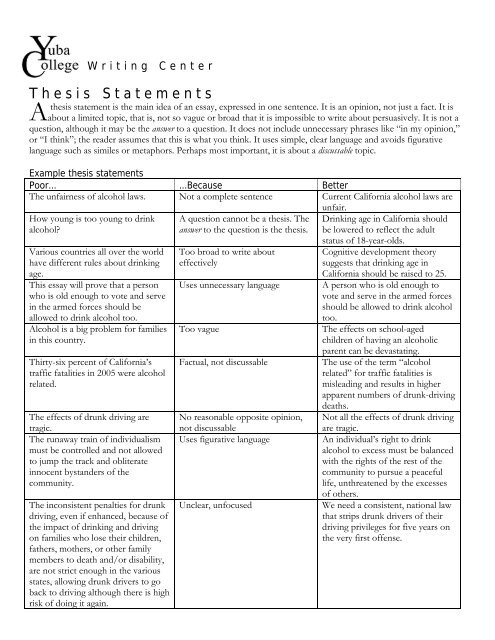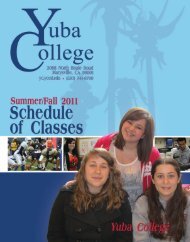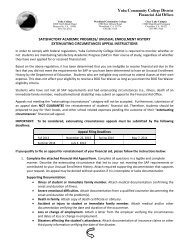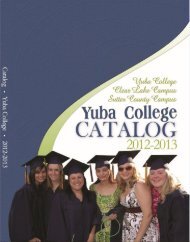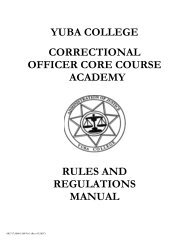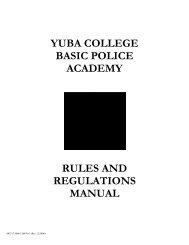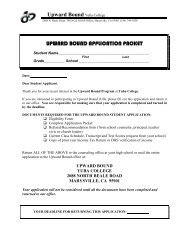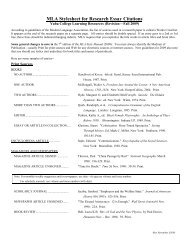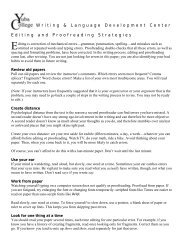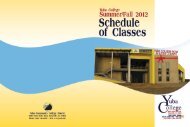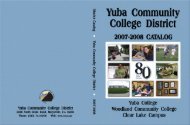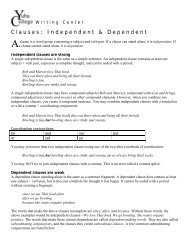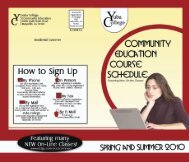Example thesis statements
Example thesis statements
Example thesis statements
Create successful ePaper yourself
Turn your PDF publications into a flip-book with our unique Google optimized e-Paper software.
Writing Center<br />
Thesis Statements<br />
<strong>thesis</strong> statement is the main idea of an essay, expressed in one sentence. It is an opinion, not just a fact. It is<br />
A<br />
about a limited topic, that is, not so vague or broad that it is impossible to write about persuasively. It is not a<br />
question, although it may be the answer to a question. It does not include unnecessary phrases like “in my opinion,”<br />
or “I think”; the reader assumes that this is what you think. It uses simple, clear language and avoids figurative<br />
language such as similes or metaphors. Perhaps most important, it is about a discussable topic.<br />
<strong>Example</strong> <strong>thesis</strong> <strong>statements</strong><br />
Poor… …Because Better<br />
The unfairness of alcohol laws. Not a complete sentence Current California alcohol laws are<br />
unfair.<br />
How young is too young to drink<br />
alcohol?<br />
Various countries all over the world<br />
have different rules about drinking<br />
age.<br />
This essay will prove that a person<br />
who is old enough to vote and serve<br />
in the armed forces should be<br />
allowed to drink alcohol too.<br />
Alcohol is a big problem for families<br />
in this country.<br />
Thirty-six percent of California’s<br />
traffic fatalities in 2005 were alcohol<br />
related.<br />
The effects of drunk driving are<br />
tragic.<br />
The runaway train of individualism<br />
must be controlled and not allowed<br />
to jump the track and obliterate<br />
innocent bystanders of the<br />
community.<br />
The inconsistent penalties for drunk<br />
driving, even if enhanced, because of<br />
the impact of drinking and driving<br />
on families who lose their children,<br />
fathers, mothers, or other family<br />
members to death and/or disability,<br />
are not strict enough in the various<br />
states, allowing drunk drivers to go<br />
back to driving although there is high<br />
risk of doing it again.<br />
A question cannot be a <strong>thesis</strong>. The<br />
answer to the question is the <strong>thesis</strong>.<br />
Too broad to write about<br />
effectively<br />
Uses unnecessary language<br />
Too vague<br />
Factual, not discussable<br />
No reasonable opposite opinion,<br />
not discussable<br />
Uses figurative language<br />
Unclear, unfocused<br />
Drinking age in California should<br />
be lowered to reflect the adult<br />
status of 18-year-olds.<br />
Cognitive development theory<br />
suggests that drinking age in<br />
California should be raised to 25.<br />
A person who is old enough to<br />
vote and serve in the armed forces<br />
should be allowed to drink alcohol<br />
too.<br />
The effects on school-aged<br />
children of having an alcoholic<br />
parent can be devastating.<br />
The use of the term “alcohol<br />
related” for traffic fatalities is<br />
misleading and results in higher<br />
apparent numbers of drunk-driving<br />
deaths.<br />
Not all the effects of drunk driving<br />
are tragic.<br />
An individual’s right to drink<br />
alcohol to excess must be balanced<br />
with the rights of the rest of the<br />
community to pursue a peaceful<br />
life, unthreatened by the excesses<br />
of others.<br />
We need a consistent, national law<br />
that strips drunk drivers of their<br />
driving privileges for five years on<br />
the very first offense.
Discussable<br />
Discussable means there must be another possible reasonable opinion about the topic. For example, “Dogs are<br />
mammals” is not a good <strong>thesis</strong> statement. There is really nothing to discuss. Similarly, “War is bad” is not a good<br />
<strong>thesis</strong> statement because there is no reasonable opposite opinion. For similar reasons, a <strong>thesis</strong> such as “A good<br />
friend is always there for you” is not strong because most reasonable people agree.<br />
Topic + controlling idea<br />
A <strong>thesis</strong> statement does two things: it states your topic—usually a couple words or a short phrase—and it states<br />
what you have to say about that topic. What you have to say controls the direction of your writing—what you<br />
include and what you omit. It is the controlling idea of your essay. Because a <strong>thesis</strong> controls what can and cannot go<br />
into your essay, it helps you select what information to include and keeps you from going off-topic.<br />
Besides controlling what can and can’t go into the essay, the <strong>thesis</strong> statement serves as a road map to your essay.<br />
Everything you intend to write about is found in the <strong>thesis</strong> statement, in the same order in which you will write<br />
about it. It’s your entire essay in a nutshell.<br />
The working <strong>thesis</strong><br />
You need to have a rough <strong>thesis</strong> in mind before you begin to write a draft. In other words, you must know what<br />
you want to say before you try to say it.<br />
If you do not have a rough, or working, <strong>thesis</strong> in mind before you begin to write, you are not drafting an essay at all.<br />
You are free writing. Free writing is a good way to generate ideas that you can later use in an essay, but many writers<br />
mistake their free writes for their first drafts. The difference between a free write and the first draft is the discipline<br />
imposed by a <strong>thesis</strong>. Without it, your writing is almost guaranteed to wander.<br />
As you write, you might find that your working <strong>thesis</strong> doesn’t accurately state what you have come to think about<br />
the topic. In this case, revise the <strong>thesis</strong> to reflect your thinking. If you change your mind, if your research forces you<br />
in a different direction, change your <strong>thesis</strong>. As you write, keep going back to your <strong>thesis</strong> to ensure that your <strong>thesis</strong>,<br />
your thought, and your essay development match. However, take care not to re-work your <strong>thesis</strong> too many times;<br />
you’re probably writing on deadline and can’t afford to keep starting over. In the end, you might find that your final<br />
<strong>thesis</strong> is quite a bit different from your original, working <strong>thesis</strong>, and that’s okay—it’s probably because you learned<br />
something.


